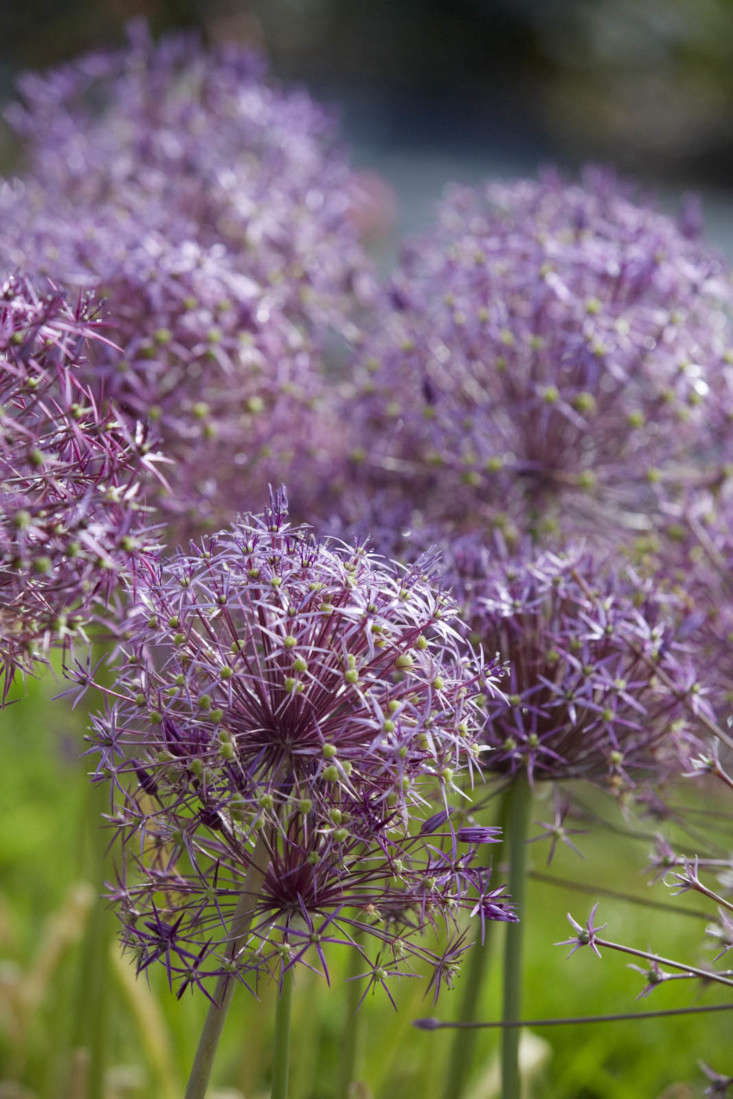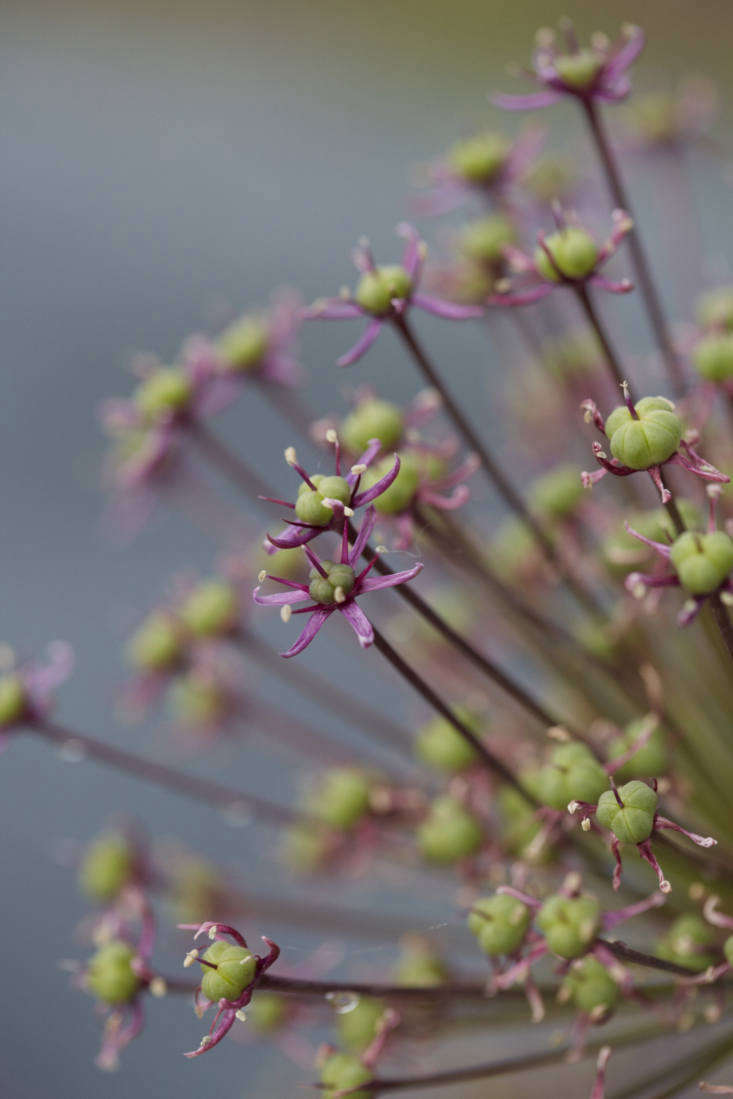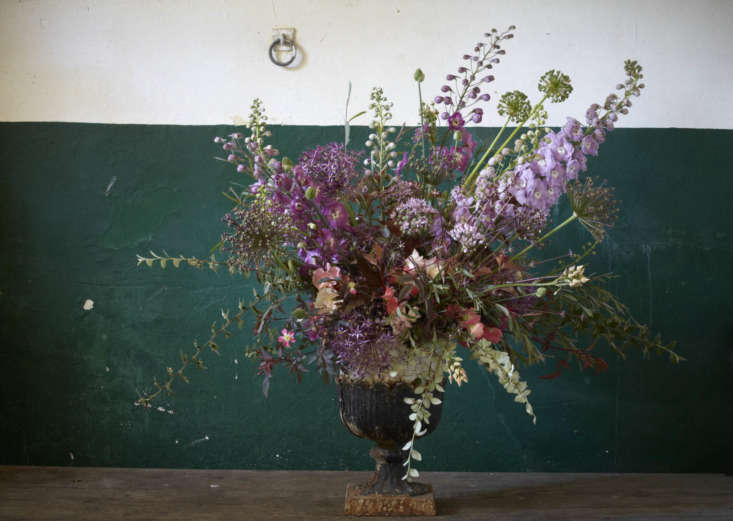In their first flush, allium flowers add to the joyous rite of spring. Although they are overtaken in color and height by midsummer blooms, their striking spherical silhouettes continue to hold their own among green herbs or nestled in fennel. When cut, a semi-spent allium adds weight to an ephemeral summer bouquet.
Ornamental alliums—not to be confused with the edible chives and onions that also belong to the Allium genus—are versatile perennial flowers with a phenomenal shelf life. Are you craving some for your garden? Read on:
Photography by Britt Willoughby Dyer except where noted.
What are the best varieties of alliums?

Polly Nicholson of Bayntun Flowers in Wiltshire, England trials flowers for cutting in her role as a specialist grower—and has a lot of time for alliums. She grows them in unimproved soil, in a field. Ornamental alliums are not only versatile, they also have strong characters, individually.

At one end of the spectrum are the “usual” flower border types which are nevertheless spectacular, such as sublimely round Allium hollandicum ‘Purple Sensation’ or smaller, egg-shaped Allium spherocephalon. Then there are the pinks, like Allium nigrum ‘Pink Pearl’ or the big ones, such as mega Allium schubertii.
After the initial prettiness of alliums, the essence of the flower comes out, whether it’s the “enormous stellar structure” of A. schubertii (in Polly’s words), or A. nigrum‘s “bare, vivid green clusters.”
When should I cut back allium seed heads?

Alliums are a fantastic draw for pollinators when in flower, and their seed heads also provide food for birds, if you don’t cut them down first. Polly dries hers in a former stable, to be repurposed for wreaths but also displayed on their own.
Intrigued? See Outbuilding of the Week: A Stable for Horses and Flowers in Wiltshire.
What is the best way to propagate ornamental alliums?

When the luxuriance of purple begins to drop away, allium becomes fuller, giving it a different kind of value in arrangements and in the outlines of a flower border. Although the developing seed heads look abundant, allium hybrids do not grow true from seed and are better propagated by gently lifting the plant for bulblets. Some varieties, such as Allium hollandicum ‘Purple Sensation’, will slowly multiply, while other varieties are a positive nuisance: check in your area.
What are the best growing conditions for alliums?

Alliums are not fussy about quality of soil (as long as there is reasonable drainage) but they do prefer full sun. If the place you have planted them in becomes more shaded over time, the bulbs can be dug up and moved. Even semi-shade can lead to floppiness or a no-show. If you are growing them specifically for cutting, the young shoots will benefit from organic slug pellets in spring.
What are some other kinds of ornamental alliums?

Sicilian honey garlic tends to sprawl if deprived of maximum sunshine levels, while migrating with vigor to places where it is most happy. But its subtle colors, waxy texture, and hanging bells of flowers make it a very sophisticated weed. The silhouette of Allium siculum evolves over the season: Spent flowers close and move skyward, resembling a sheaf of arrows.

What are good companion plants for alliums?

In a display, alliums can be odorous (some would say malodorous), particularly the Sicilian honey garlic. Polly suggests adding herbs, sweet peas, and other highly scented flowers to alliums, as a kind of nosegay.

A later-blooming, excellent value variety is the drumstick Allium sphaerocephalon. Pale buds develop into a marvelous burgundy-green, rivaling the more metallic flower. When cut, they can be used for adding airy full stops as in the arrangements to follow.
What is the best way to arrange alliums as cut flowers?

“Allium schubertii form the base, through which the others are threaded,” explains Polly of her arrangement using different types of alliums, all at slightly different stages of their development. “It’s almost like having a loose ball of chicken wire in the neck of the vase.”

“The other alliums provide wonderful texture and form in the body of the bunch,” continues Polly. “They make interesting silhouettes peripherally.” Their height is balanced with foliage; their spherical nature, when young and old, is echoed by the delphinium in bud.
For more growing tips, see Alliums: A Field Guide to Planting, Care & Design in our curated guides to Bulbs & Tubers 101. See more ways to use alliums to great effect in a flower bed:
- Alliums: Just As Good As Tulips But Better
- DIY: Alliums, Three Ways
- Gatehouse Garden: A Dramatic Black Backdrop for a White Wildflower Meadow









Have a Question or Comment About This Post?
Join the conversation